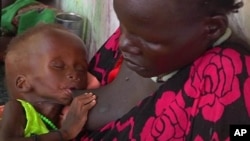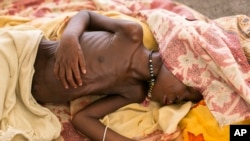South Sudan's health ministry is teaming up with aid agencies to screen tens of thousands of children for malnutrition.
The first-ever such screenings in South Sudan will be conducted in Central Equatoria, Northern Bahr el Ghazal and Warrap states. The information gathered will give the government an idea of how many children are going hungry in South Sudan.
"Up to now, we don’t know the level of malnutrition of our children," Health Minister Emmanuel Ija said. "With this campaign, we can ensure that every child is reached with proper nutrition to give every child a health start.”
Two-hundred-fifty-four trained social mobilizers will start going door-to-door in Juba, in Central Equatoria, on Wednesday. The program will be rolled out in the near future in the other two states and will run for several weeks, Ija said.
The mobilizers will refer any children found to be suffering from under-nutrition for treatment and will instruct caregivers on the best ways to feed their children and keep them healthy, Ija said.
Dr. Samson Baba, director general for primary health care at the National Ministry of Health, said the campaign will educate caregivers "to become more aware of their children’s nutrition conditions and the impact on their growth (and) achievement of full potential."
"It is also aimed at supporting mothers to adopt life-saving behavior in feeding children and also to improve their nutritional status,” Baba said.
Vilma Tyler, chief of nutrition for the United Nations Children's Fund (UNICEF) in South Sudan, said more than 116,000 children between the ages of six months and five years will be screened in Juba county alone.
Experts have warned that 235,000 children in South Sudan will suffer from severe acute malnutrition by the end of the year because of the fighting in the country. UNICEF, the World Food Program and the South Sudan government have strategies in place to tackle the problem, Tyler said.
Hunger and children
According to UNICEF, nearly half of all deaths in children under the age of five are attributable to undernutrition, or hunger.
Poor nutrition in the first 1,000 days of a child’s life can also lead to stunted growth, which is irreversible and associated with impaired cognitive ability and reduced school and work performance, UNICEF says.
UNICEF began warning in April that tens of thousands of children under the age of five could die of hunger this year in South Sudan, unless food and medical aid are stepped up.
"The on-going conflict has pushed them to the edge – unless treatment is scaled up immediately, up to 50,000 children under the age of five are likely to die," UNICEF said in a statement.










